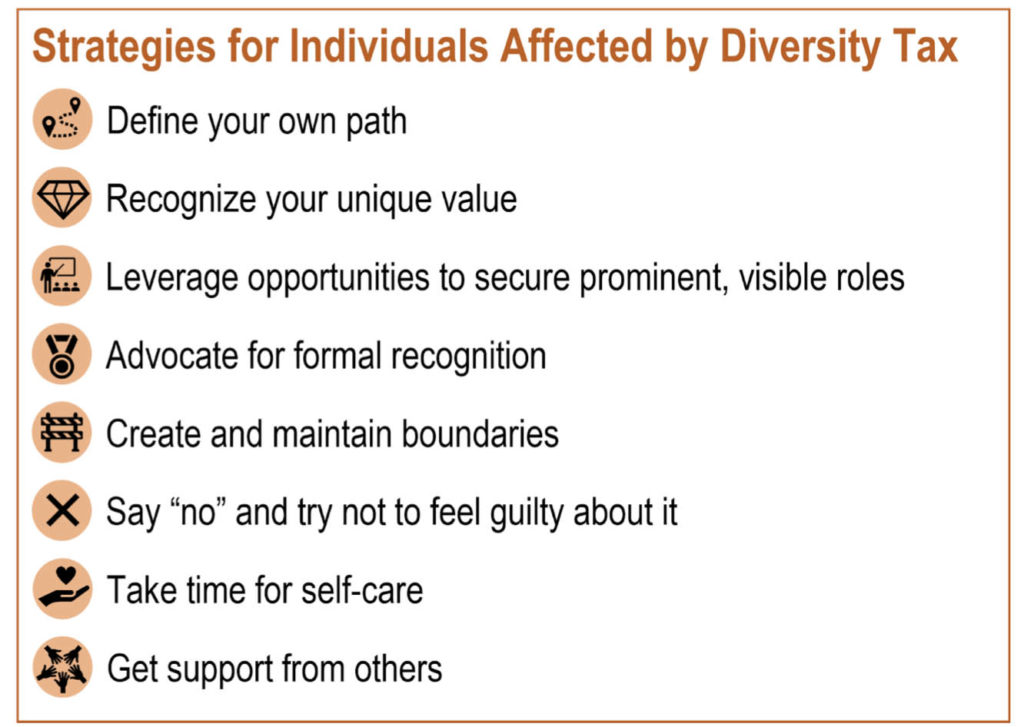Editor’s Note: This is the second in a series of posts that will run this week, written by Chhavi Chauhan, Shaina Lange, and Tony Chen. Chhavi is Director of Scientific Outreach at the American Society for Investigative Pathology (ASIP) and Director of the Continuing Medical Education (CME) Program at the Journal of Molecular Diagnostics. Shaina is Manager of the Publishing Integrity Office at ACS Publications. She oversees the strategy, policies, and activities to support publishing integrity across the ACS journals portfolio. Tony is a Journal Publishing Manager at Wiley, where he manages a portfolio of journals in Oncology, Pathology, and Basic Medical Science under the Health Sciences banner.
In the first post of this series, we defined “diversity tax” and shared a powerful testimonial on how this concept can manifest in the scholarly publishing workplace. If you have ever been affected by the diversity tax, you might be wondering what you could have done differently or how you could avoid being impacted in the future. As a reader and ally, you might be wondering what you can do to support diversity, equity, inclusion, and accessibility (DEIA) efforts while avoiding overburdening affected individuals. In the next three posts of this series, we offer recommendations for individuals and organizations on addressing diversity tax while advancing DEIA efforts in an informed and impactful way.
For those affected, the internal conflict between wanting to help and wanting to be recognized for that help may never truly go away; however, the strategies below might help you navigate this conflict and empower you to make decisions for your own future. These suggestions are based on other literature (including this article), personal experiences, and the anonymous contribution of our colleague in the first post.

- Define your own path. Consider your professional and career goals, including how you want to be seen in your workplace and what self-attributes you want to promote. If you are passionate about DEIA issues but have unrelated career goals, you may need to more thoughtfully and selectively explore those passions while balancing intentional career growth. If you want to position yourself as a DEIA champion, DEIA efforts are career opportunities and your contributions may help you further those goals.
- Recognize your unique value. Internalized feelings of imposter syndrome can be heightened for members of an underrepresented minority. When you are the only person in a meeting who looks like you or talks like you, it can spur internal questions about why you deserve a seat at the table and whether or not you are there as a “token” contributor. Acknowledge those questions and feelings. Remind yourself that you have valuable intellectual contributions and unique perspectives while recognizing that you don’t need to justify or prove your worth.
- Leverage opportunities to secure prominent, visible roles. When asked to join or lead an initiative, consider the level of effort and intended impact and weigh that against the value of your contribution and time. For example, you might be more inclined to accept a position in which you have the ears of your organization’s executive leadership, which can support your professional goals while also resulting in major change. Use those opportunities to bring visibility and meaningful change both to you as an individual and to the issues at hand. As you consider these opportunities, keep in mind that securing such a role can be a double-edged sword; the more you put yourself out there and establish yourself as a DEIA resource or expert, the more chances you will be approached to engage in other volunteer efforts.
- Advocate for formal recognition. Many DEIA initiatives are viewed as “volunteer” projects, beyond the day-to-day scope of an individual’s position. But the reality is that these initiatives are critical to both the success of your organization and of the larger scholarly communications industry. They are equally, if not more, important than your annual goals in terms of their widespread, long-term effects. As such, your involvement should be formally recognized as part of your performance objectives and compensation package. If this isn’t the case, you may need to advocate for yourself. Consider reaching out to your Human Resources team or, in the absence of such structural support, seek guidance from friends or mentors.
- Create and maintain boundaries. Your time is yours to protect; you can’t do it all. If you do get involved in a project, you may need to set boundaries for when and how much you can contribute. You also may need to step back at certain points, limit your time commitment, or end your involvement in order to accommodate professional and personal changes. It is important to remember that DEIA initiatives are often long-term evolving commitments with little measurable impact at first; incremental progress is still important and may lay a strong foundation for lasting cultural changes. Well-structured initiatives should allow for personnel turnover and be sustainable beyond your individual involvement.
- Just say no. And, even harder, try not to feel guilty about it. This is easier said than done. It’s often tempting to say “yes” and deal with the frustration later. To thoughtfully consider a request, take time – days or weeks – to confidently respond. If you need to, negotiate to make space in your workload. Consider what other projects or tasks you may have to reallocate or de-prioritize. If and when you do say no, be transparent about the reason(s) why. If you know of an appropriate colleague, gauge their interest first and then suggest them in your place.
- Take time for self-care. Involvement in DEIA efforts can be emotionally draining and distressing at times. To bring your best self to the table, you may need to take time away from these topics and focus on your physical, mental, and emotional wellbeing. Consider ways to remove or decrease your anxiety and stress, including seeking professional support, engaging in physical fitness activities if able, and/or practicing mindfulness or meditation. Self-care can also include taking the time for other things you enjoy, spending time with family or friends, or connecting with other advocates in the community. There are a lot of resources, including this one from the National Council for Mental Wellbeing one for anyone looking to prioritize their mental health and this one specifically for underrepresented communities.
- Get support from others. Identify a trusted mentor, colleague, friend, ally, or family member who can help guide and support you. Depending on your needs, you might seek support from someone within your organization, outside your organization but in a similar role as yours, or outside the industry altogether. When you are faced with certain situations like conflicting thoughts and decisions on getting involved with a DEIA effort, confiding in a friend or mentor can help resolve feelings of isolation and be a source of relief.
We hope that our colleagues from marginalized groups find this post useful and find solace in knowing that these feelings are valid. We invite you to comment below (note that you can comment anonymously) on other challenges you have faced and tactics you have tried.
We also hope that this post brings a new awareness to individual allies for themselves and their future collaborations. In the next two posts of this series, we will explore how an awareness of diversity tax can help allies and organizations approach DEIA initiatives inclusively.
Discussion
3 Thoughts on "Guest Post – Reducing the Burden of Diversity Tax: Recommendations for Affected Individuals"
Thank you to the authors for this series for raising a very important topic that is so often overlooked. As a person who was affected greatly by the diversity tax over many years, this post (and the previous) resonated deeply with me. These strategies are all excellent and ones I have used in my experience as well. It took me a while to utilize the “saying no” strategy, mostly due to guilt and the fear that if I say no, then no-one else will step up and the important issue will remain unaddressed. One thing that I have come to terms with, is that there is infinite space and time to work on DEIA issues. It doesn’t feel that way of course, because of the systemic inequity and discrimination that have existed for ages (and the lack of progress), so there is always that feeling of urgency to act (and it’s a necessary feeling). But there is no “end” to the DEIA journey, it’s an ongoing effort that should always be worked on, improved on, cared for. It’s ok to be selective, to take a break, to stay no, and jump back in later if and when you have the capacity.
Thanks again – very much looking forward to the rest of the series!
Thank you so much for your thoughtful comment and your appreciation of this blog post series.
Hello, thank your for your comment. We totally agree, I have had this feeling many times already. Sometimes it is good to take a step back for yourself before you jump back into the never-ending journey for DEIA


